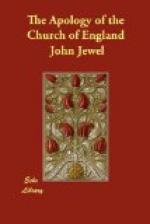hath he his legates (as much to say as most subtle
spies) lying in wait in all kings’ courts, councils,
and privy chambers? Why doth he, when he list,
set Christian princes one against another, and at
his own pleasure trouble the whole world with debate
and discord? Why doth he excommunicate, and
command to be taken as a heathen and a Pagan any Christian
prince that renounceth his authority? And why
promiseth he his “indulgences and his pardons”
so largely to any that will (what way soever it be)
kill any of his enemies? Doth he maintain empires
and kingdoms? or doth he once desire that common quiet
should be provided for? You must pardon us,
good reader, though we seem to utter these things more
bitterly and bitingly than it becometh divines to
do. For both the shamefulness of the matter,
and the desire of rule in the Bishop of Rome is so
exceeding and outrageous, that it could not well be
uttered with other words, or more mildly. For
he is not ashamed to say in open assembly, “that
all jurisdiction of all kings doth depend upon himself.”
And to feed his ambition and greediness of rule,
he hath pulled in pieces the “empire of Rome,”
and vexed and rent whole Christendom asunder.
Falsely and traitorously also did he release the
Romans, the Italians, and himself too, of the oath
whereby they and he were straitly bound to be true
to the “emperor of Greece,” and stirred
up the emperor’s subjects to forsake him:
and calling Carolus Martellus out of France into Italy,
made him emperor, such a thing as never was seen before.
He put Chilpericus, the French king, being no evil
prince, beside his realm, only because he fancied
him not, and wrongfully placed Pipin in his room.
Again, after he had cast out King Philip, if he could
have brought it to pass, he had determined and appointed
the kingdom of France to Albertus King of Romans.
He utterly destroyed the state of the most nourishing
city and commonweal of Florence, his own native country,
and brought it out of a free and peaceable state,
to be governed at the pleasure of one man: he
brought to pass by his procurement, that whole Savoy
on the one side was miserably spoiled by the Emperor
Charles the Fifth, and on the other side by the French
king, so as the unfortunate duke had scant one city
left him to hide his head in.
We are cloyed with examples in this behalf, and it should be very tedious to reckon up all the notorious deeds of the bishops of Rome. Of which side were they, I beseech you, which poisoned Henry the Emperor even in the receiving of the sacrament? which poisoned Victor the Pope even in the receiving of the chalice? which poisoned our King John, king of England, in a drinking cup? Whosoever at least they were and of what sect soever, I am sure they were neither Lutherans nor Zuinglians. What is he at this day, which alloweth the mightiest kings and monarchs of the world to kiss his blessed feet? What is he that commandeth the emperor to go by him




